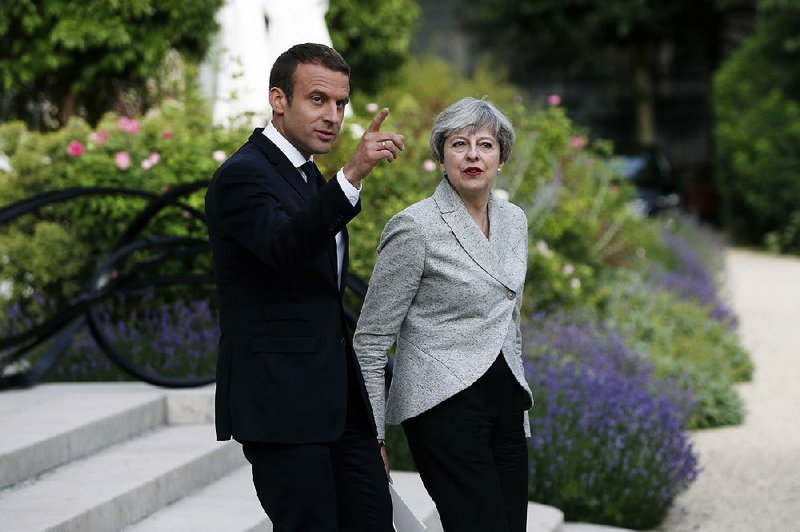PARIS -- British Prime Minister Theresa May and French President Emmanuel Macron held talks Tuesday and agreed that negotiations for Britain's divorce from the European Union will start next week as planned.
They also reached common ground on fighting a shared enemy: terrorism. Standing side by side in the garden of the Elysee Palace after a working dinner, the two leaders announced plans to pursue an initiative to require tech companies to better police online extremism and hold them legally liable if they fail to do so.
"We are united in our total condemnation of terrorism and our commitment to stamp out this evil," May said.
May arrived in Paris with her leadership hobbled by election losses last week just as the U.K. heads into tough talks on leaving the EU.
While May struggles to hold on to power, Macron is on the ascendancy, with his year-old party poised to win a huge majority in parliamentary elections Sunday.
Seeking to allay European concerns after her election setback, May reaffirmed Tuesday that "the timetable for EU-exit negotiations remains on course and will begin next week."
British officials had previously suggested they wouldn't be able to formally start exit negotiations as scheduled.
Macron called for the negotiations to "start as soon as possible" but added that the door remains open for the U.K. to remain in the EU. From a European point of view, he said, as long as the negotiations are not over, there is still a possibility to change the course of events.
Still, he acknowledged, "the decision [to exit the EU] has been taken by the sovereign British people. I do respect that."
The talks Tuesday also focused heavily on deepening counterterrorism cooperation, especially reducing extremist propaganda circulated online. Britain and France face similar challenges in fighting homegrown Islamic extremism and share similar scars from deadly attacks that rocked London and Manchester in the U.K. and Paris and Nice in France.
May said major Internet companies have failed to live up to commitments to do more to prevent extremists from finding a "safe space" online. Macron urged other European countries, especially Germany, to join the effort to fight Islamic extremist propaganda on the Web.
After the Islamic State extremist group recruited hundreds of French fighters largely through online propaganda, France introduced legislation ordering French providers to block certain content, but it acknowledges any such effort must reach well beyond its borders. Macron has lobbied for tougher European rules, but details of his plans remain unclear.
The United Kingdom already has tough measures, including a law that gives authorities the powers to look at the Internet browsing records of everyone in the country.
After their talks, May and Macron headed to the Stade de France north of Paris to watch a France-England exhibition soccer match honoring victims of the recent attacks in Manchester and London. In an emotional show of support, players from both teams walked onto the field to sounds of the Oasis song "Don't Look Back in Anger," played by the French Republican Guard. Then Macron and May joined French and British fans in singing the British national anthem "God Save the Queen," followed by a minute of silence.
Two big screens at the stadium projected the red-and-white Cross of St. George -- the flag of England, part of the U.K.'s Union Jack -- and giant flags from both England and France were rolled out onto the field.
Three attackers mowed down pedestrians on London Bridge and then stabbed people in nearby Borough Market on June 3. Eight people were killed and dozens more injured. On May 22, a man detonated a bomb as crowds were leaving an Ariana Grande concert in Manchester, killing 22 people.
France's players were touched by the overwhelming show of support they received from England fans when they played an exhibition match at Wembley Stadium on Nov. 17, 2015 -- just four days after attacks hit the Stade de France, cafes and a rock concert, killing 130 people. England fans that night sang along with the French anthem.
Information for this article was contributed by Angela Charlton of The Associated Press.
A Section on 06/14/2017
